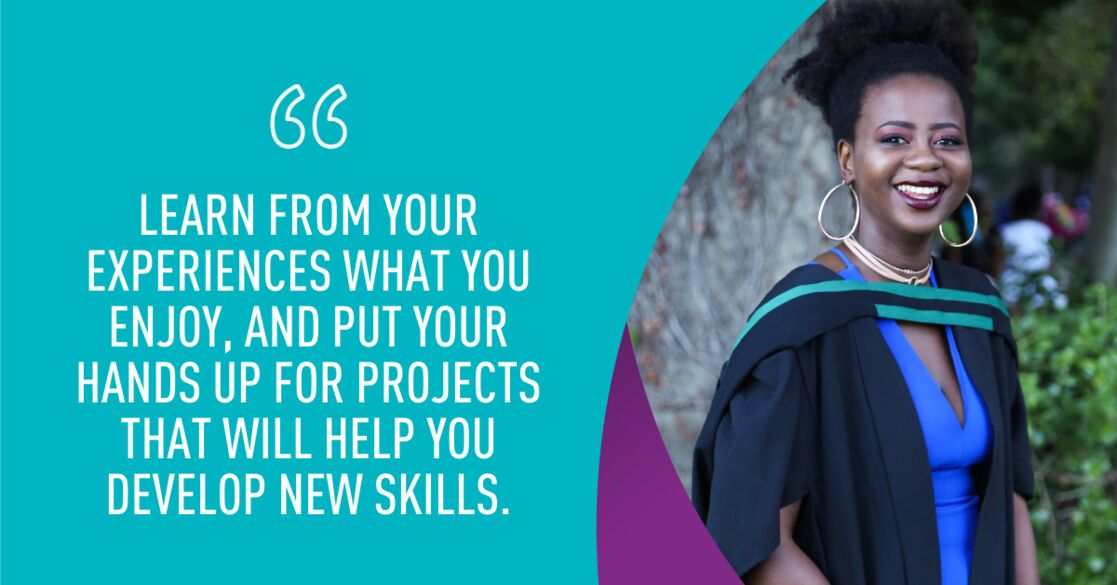Job opportunities for university graduates with skills in data analytics are on the rise. Dell Young Leaders alum Noloyiso tells us about her journey from graduating in engineering to landing her dream career as a data analyst. Learn more from Noloyiso on the importance of constantly upskilling, and skills that will prepare you for success in an exciting and evolving industry.
Tell us about yourself.
I was born and bred in Cape Town, from the streets of Gugulethu. I am a lover of the arts and love work where science and art meet. I have a Bachelor of Science in Chemical Engineering and gained experience as a consultant by working on different projects from different industries. I consider myself a problem solver who loves taking on new challenges. Right now, I’m a data analyst where I also teach students math and love organizing ‘Festive Fridays’ at work.
What is the typical day in the life of a data analyst?
I see myself as a jack of all trades! I like to get involved in many projects in my current role. At the start of my day, I set expectations for myself. If I’m going to have meetings, stand-up calls, or training – I set expectations for myself depending on what I need to do. Most of the time I’m thrust into projects I have limited experience in, from finance to credit risk, so I invest time in research to understand the market landscape. I do lots of research on data science and find easier or better ways of doing things.
How did you transition your career into data analytics?
I didn’t study computer science in university so I taught myself a programming language during my graduate program after I first qualified for my degree. A friend in the same program was doing some research on machine learning that I thought was really interesting. I thought it wouldn’t hurt to know a programming language, so I learned Python. I was really interested in it and that’s what made me certain I wanted to venture into the data industry.
What other skills do you use at work?
In my position, I prepare presentations and analyses and manage relationships with clients and external vendors. All people are different, so having interpersonal and communication skills are very important. Dealing with people and trying to understand what they are trying to achieve is a very important skill to have.
What advice would you give to graduates starting out in data analytics?
I’ve been a process analyst, test analyst, and now a data analyst. It is important to remember in your first job is as much as you will likely have very cool projects to work on, your role may not always be the fanciest. Learn from your experiences what you enjoy, and always put your hands up for projects that will help you develop skills and experience.
This industry can be really demanding. My former manager said there are two B’s in work life – boundaries or burnout. If you don’t set boundaries with the people that you work with, you will burnout because people will keep pushing.
Also, be humble and accept the fact that there will always be someone smarter than you. There will be people who are going to challenge you on your logic and thinking, and you have to be able to accept criticism and move on from that without taking it personally.
What tips do you have for students interested in this career?
Do as many internships and vacation work opportunities as you can. In university, I was involved in many things outside of my degree, and it shows that I had interests outside of what I was studying. Another thing to focus on is understanding the logic behind the code. A senior leader at my company says “the code you can always find online, but understanding the logic is the most important thing”. Any final words of wisdom?
Always believe in yourself and think about being hired as a mutual agreement. When you get hired for a job, you shouldn’t just think about what you can do for the company but also what the company can do for you.
Upskill constantly. I’m constantly entering a space that I’ve never been exposed to and my knowledge is limited. I have to upskill myself in a short amount of time by asking a lot of questions and doing my own research.
Given the current economic environment, new university graduates face a steep road ahead.
The Career Insights Series is designed to help graduate job seekers. Dell Young Leaders alumni share insights on their career path, highlight a day in their life at their employer, and provide guidance to students on how to stand out to employers and prepare for the world of work.

